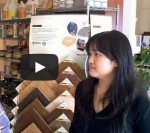 If it sounds a bit that “Green Living” is my favorite topic it is because its true… Laundry detergent made from flowers! Flushable diapers! Potato chips fried in organic oils! Have you noticed how these days, everything seems to be marketed with an eco-spin – even products that are notoriously bad for people and the planet? So are companies truly seeing the green light, or are they just “greenwashing”? Here are a few red flags and shopping tips that will help you choose products that really make a difference.
If it sounds a bit that “Green Living” is my favorite topic it is because its true… Laundry detergent made from flowers! Flushable diapers! Potato chips fried in organic oils! Have you noticed how these days, everything seems to be marketed with an eco-spin – even products that are notoriously bad for people and the planet? So are companies truly seeing the green light, or are they just “greenwashing”? Here are a few red flags and shopping tips that will help you choose products that really make a difference.
Vague claims. Words like “natural,” “green,” “eco,” “nontoxic” and even “biodegradable” don’t mean much on their own. They’re easy to slap on a product, and they’re not currently regulated. Look for more concrete terms like “organic” and “recycled,” which are overseen more closely by the feds and verified with a symbol on the package. (And note that “recyclable” just means you might be able to recycle the product in your community, while “recycled” actually means the company has incorporated recycled materials in the product.)
Pretty packaging. More and more products, especially cosmetics and household cleaners, are adopting a “natural” look. Is your laundry detergent really made from flowers, or has it simply added 1 percent flower oil to its chemical mix? Read the ingredients to find out.
Non-transparency. If a company doesn’t have the space on its product to explain its green claims, it should make the information available on its Web site or through its customer service department. Look for a phone number or Web address on the package — if you can’t find it, or if it’s hard to track down more details, there’s something fishy going on.
Big promises. If it sounds too good to be true, it probably is. Can you really make up for a year’s worth of driving by paying a carbon-offset surcharge when you buy a car?
Can a biodegradable diaper really biodegrade if it’s smooshed into a deep, dark landfill? (Doubtful, and no.) Companies want to ease our minds with such promises but instead, we should learn as much as we can about the realities behind the claims.
Look for certification. There are a few trustworthy certifications out there that, while not perfect, are reliable. Use them as your guide. Look for the federal government’s Energy Star designation on appliances and electronics; the USDA organic seal on food and cosmetics; Green Seal on household cleaning products; and the Forest Stewardship Council logo on wood and paper products.
Environmentalists suggest that we think about how we buy, not just what we buy. Personally, I like to buy in bulk (from Costco) to reduce individual packaging and save a few buks along the way. Also, it’s always a good idea to buy durables instead of disposables (like re-chargeable batteries) or maybe even first think about whether we really need the item in the first place. Happy green shopping!
 Be Aware of What Are You Breathing this Holiday Season
Be Aware of What Are You Breathing this Holiday Season Robinson Crusoe’ing in New Zealand: Great Barrier Island Community Lives Completely Off-the-Grid and Feels More Connected than Ever
Robinson Crusoe’ing in New Zealand: Great Barrier Island Community Lives Completely Off-the-Grid and Feels More Connected than Ever Non-toxic and Sustainable Materials Tour at the Green Pika
Non-toxic and Sustainable Materials Tour at the Green Pika